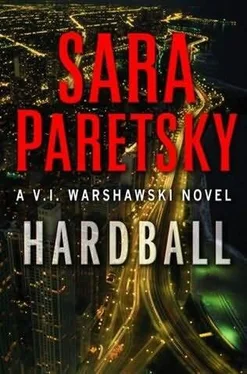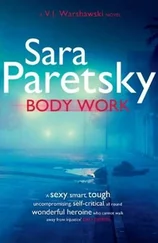“Anything is possible. You ever been held up by a junkie who thinks he can sell your fiddle for a fix?”
Thibaut laughed softly. “One advantage of playing a really big instrument: people know they can’t race off down the street with it. Let me put Bessie to rest, and I’ll be with you. I hope you’re clean. I don’t want sweat and grease or anything on the inside of the case.”
I went back into my place and carefully wiped all the protective cream from my face and arms. I realized I was hungry; I hadn’t eaten since breakfast yesterday morning. Fatigue and anxiety had kept me from thinking about food, but I was suddenly ravenous. Thibaut came into my kitchen as I was hastily putting together a cheese sandwich.
“You can’t eat inside the case,” he said. “Probably you won’t be able to breathe in it, either. The old guy downstairs is going to sue me if you suffocate?”
“Nah. He’ll just let the dogs chew on your bass.”
Thibaut helped himself to a chunk of the pecorino I was eating. “I can’t carry you down the stairs. I’m not sure the case would hold your weight, but I’m sure I can’t.”
“I’ll come down the front stairs and get out to the garden through the basement door. When you’re at the bottom of the back stairs, I’ll try to creep along in your shadow. I’ll wait to climb into the case until you’re at the back gate. You can wheel me down the alley to your car.”
I went into my bathroom to rub mascara on my cheekbones so they wouldn’t reflect light back from the streetlamps; I hoped it wouldn’t come off in Thibaut’s case. I put on a navy windbreaker and stuck my keys and my new wallet, with cash and passport inside, in my hip pocket. I checked that the safety on the Smith & Wesson was on, pulled a Cubs cap low over my forehead, and ran as lightly as I could down the front stairs.
The only difficult moment came as I passed Mr. Contreras’s front door. Mitch let out a sharp bark and a whine, demanding to join me. Once I went past him and into the basement, he quieted down.
When I slid back the bolt on the basement exit, Thibaut was just bumping his case down the last flight of back-porch steps. I waited for him to reach the walk, then slipped into his shadow. He worked the move like a pro, not looking over his shoulder for me but pulling out his phone and complaining to someone he addressed as Lily, “You must be stoned as well as drunk to want to practice the Schulhoff piece this hour of the night. But, my little chickadee, to hear is to obey. I’m on my way.”
At the back gate, I managed to stuff my sixty-eight-inch frame into the fifty-six-inch case. As Thibaut had warned, I could barely breathe. The few minutes where he bumped along the broken concrete into the alley and, panting and wheezing, laid the case across the flattened-out entrance to the backseat were an agony for my spine and neck. Once I was on the seat, he unhooked the case’s hinges. I pushed the lid up a few inches with my knees so that I could straighten out my spine.
Again without looking over his shoulder, Thibaut asked for my office address. I told him he could drop me on Belmont, where I’d flag a cab.
“V. I. Warshawski, I didn’t seriously risk the life of this twenty-two-hundred-dollar case to drive you four blocks. Tell me where you’re going.”
I didn’t put up a serious fight. I was glad of the offer. I sent him on a route up past Wrigley Field, turning onto side streets until he was sure no one was following him. Finally we drove to an intersection a block north and east of my office. If the office was under surveillance, I didn’t want anyone registering Thibaut’s car in a database.
I flexed my spine and did a few neck stretches before leaning into the driver’s window to thank him. “Who’s Lily?”
“The fox terrier we had when I was a kid. When all this is over, I’ll play a concert for you. The Schulhoff concertino, to commemorate my most exciting performance since my Marlborough Festival debut.”
He squeezed my fingers where they rested on his open window. The warmth of his hand stayed with me as I slipped into the shadow of the buildings on Oakley.
CONFESSION IN MYSPACE
I DIDN’T KNOW ANY UNOBTRUSIVE WAY TO GET INTO MY office. The alley exit opens only from the inside, and the windows are twelve feet from the ground. It would have to be through the front door.
At this hour of the morning, all the trendy bars and cafés in the area are closed. The coffee shop across the street would open in a few hours, but right now its glass front gleamed black under the streetlamps like a pond.
I moved cautiously down the street, gun in hand. No one was out that I could see. But if pros were conducting surveillance, it could be done by remote camera. They wouldn’t have to be on the street.
A rat leaped from a garbage can at my approach, and I came close to screaming. I had to stop and gulp down the wave of panic that swept over me, as it ran out onto the sidewalk. Still, I couldn’t hold back a little cry. A car drove up the street and turned left onto Cortlandt. It was missing a taillight. Dornick looked like the buttoned-down type who wouldn’t let you work for him if your car was missing a light. Or would he use a car like this to make me think he wasn’t watching me?
Or he could be… Enough! The Age of Fear makes you crazy. I took a breath, crossed the street, and tapped in the new door code to my building. The lock wheezed as it always did, a loud sound in the still night, but I was tired of fear. I boldly opened the door, stopping long enough to tap each of the numbers on the pad so that anyone using a UV spray wouldn’t be able to tell which ones unlocked the door. I flicked on the lights, not caring that they would spill out onto the street and advertise my presence.
My office suite still had a crime scene seal across the door, but I broke it and went into the chaos. For a moment, my spirits flagged again on seeing the mess. I made a feeble stab at straightening things out, putting drawers back in the desk, returning ordnance maps to their shelves, but the chaos was overwhelming. I wondered who I could hire to help since the temporary agency had backed away from me at warp speed.
I tried to remember the date that Petra had been in my office to use my computer, but I could only guess. It had been around two weeks before the Navy Pier fundraiser. I set up a program to find all the Internet sites visited during those weeks.
While the program ran, I knelt to collect papers from the floor, gathering them in a big bundle and laying them on the couch. One of the documents was the transcript of the Steve Sawyer trial. I flipped through the pages, looking again for my father’s name, but instead “Lumumba” jumped out at me.
“Lumumba has my picture,” Steve Sawyer had said on the stand.
Lumumba: Lamont, in the Anaconda’s secret code. Lamont had Sawyer’s picture. What did that mean? Was it some cryptic way of saying that Lamont had fingered him? Or did it mean he was expecting Lamont to testify for him. As in, Lamont has my picture, Lamont has my back.
I wondered if Curtis Rivers would interpret… Curtis Rivers! I smacked my forehead. African names. Kimathi, that was what Rivers called the man who swept the sidewalk in front of his store. While my Internet-search program was running, I pulled up a separate browser window and looked up Kimathi.
Dedan Kimathi, a rebel leader in Kenya in the 1950s. Feeling a sort of nervous dread, I put the name into the Illinois Department of Corrections database. There he was: January 1967, convicted of murdering Harmony Newsome, served forty years, released a year ago January. No time off for good behavior, often in isolation for unspecified, violent outbreaks. Living since his release on Seventieth Place, at the same address as Fit for Your Hoof.
Читать дальше












